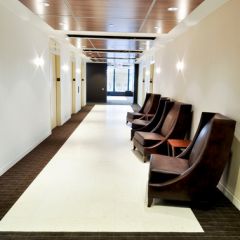Tim Storm reveals the dark and dirty truth in the first paragraph of his column in the latest General Practice, Solo & Small Firm newsletter.
"I remember a moment during a session of my bar review course many years ago. The instructor paused in the midst of his lecture, turned to the audience of recent law school graduates and asked: 'Don’t you hope that new doctors know more about practicing medicine than you know about practicing law?' The wave of nervous laughter sweeping the room showed that the others were thinking just what I was."
Law schools -- most of them -- teach graduates how to "think like lawyers" but not how to be lawyers. Immediately after law school comes the bar review, closely followed by the bar exam. "Most everyone else in the [review course] knew that they, too, had no business being unleashed on the public as full-fledged attorneys," Storm writes. "And yet that was exactly what was about to happen for the 80 percent or so of us who would pass the bar."
We've lived with this approach for decades. What's different now? "The proportion of new graduates who will hang out their own shingles continues to grow," Storm writes. He sympathizes with them, and with the "judges, other attorneys, and clients who may encounter those who hold the same license to practice as the rest of us, but who have never been fully socialized into the practice of the learned profession."
What is to be done? Read Storm's insights and suggestions.

 The Illinois Bar Foundation will honor former FCC Chair and longtime Sidley Austin managing partner Newton Minow as the 2011 Recipient of the Distinguished Award for Excellence.
The Illinois Bar Foundation will honor former FCC Chair and longtime Sidley Austin managing partner Newton Minow as the 2011 Recipient of the Distinguished Award for Excellence.